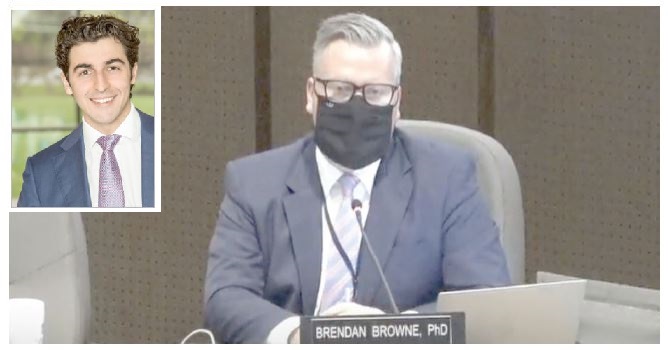Can’t do my job with “suppression
of information”, Trustee Di Giorgio
TORONTO – It started with what seemed a simple question by trustee Daniel Di Giorgio: to whom does the Integrity Commissioner (IC) report? To the Board of trustees, answered the Director. I am a trustee, why does the IC have to ask the Director for permission to answer any of my questions, Di Giorgio (in the little pic, below) asked the Chair, who promptly turned to the Director, Brendan Browne (in the big pic, below). He in turn handed the answer to TCDSB in-house legal counsel, Paul Matthews, who responded (and I summarize for those who cannot go to the video/audio tape of the meeting) that questions posed by a singular trustee are considered “operational issues” and the Director is the only one responsible for operational matters.
Di Giorgio protested further, arguing that he was not able to make decisions on any recommendations offered by the IC if he did not know what powers the IC had. Matthews elaborated: the Board surrendered (my words) all of those powers to the Director when they authorized the Staff to select and hire the IC. From there on in, everything the IC does is operational: there is no “independence of thought” on the IC’s part – he follows instructions; and he does not take any from trustees.
The TCDSB has an annual budget of some $1.25 billion, 90,000 students and approximately 10,000 staff. A frustrated Di Giorgio uttered the obvious conclusion: trustees cannot do their job if there is a suppression of information.
For those who do not know, “suppression of information” is a euphemism for “hiding vital information from inquiring minds” – “what they don’t know, they can’t use… against us”, as it were.
In other words, a cover up. That would be the opposite of openness and transparency, both of which are in the public interest and good governance. Some might suggest that these are values one should expect in education and in a democratic environment because the absence of them leads to manipulation, lying and abuse of position and authority.
So, what is the TCDSB, a Catholic school board, “suppressing”? The answer must lie in the discussions held in Private session from which trustees had just emerged. The Chair read out a Statement apparently required as part of an Agreement announced in Private session to put some issue to rest. Di Giorgio could not bring himself to accept, despite an aggressive line of questioning from trustee Rizzo. The Chair’s Statement referenced an apology – by the Board – to former Teachers’ Union President Patricia Minnan-Wong, who on June 17, 2019, during a recess at a TCDSB meeting, had been threatened with physical harm by trustee Rizzo (then Chair). People present were struck by her obscenity ridden language threatening/ promising to visit violence on the union leader.
The police were not called in. Instead, in a compromise, the matter was referred to the Labour Relations Board for solution – the Union asked for a monetary settlement (allegedly $50,000 for itself, $10,000 for Ms. Minnan-Wong, plus an apology). The TCDSB was named as co-defendant for good measure because the incident took place on Board property.
Twenty-one months later, in Private session (Thursday) the results were announced and referred to Public session for a vote. As noted, the Board acknowledged that there had been a breach of the Trustee Code of Conduct and Workplace Harassment policy and apologized accordingly.
Rizzo, abstained from the vote and, reading from prepared notes, declared a conflict of interest, on the advice of the Integrity Commissioner. Judging from Di Giorgio’s line of questioning on the matter in the past, he would have asked who paid the $60,000, what would have been the legal fees and who paid them. Fair questions if he raised them.
It is now public knowledge that Rizzo (along with at least three of her colleagues) is embroiled in two other serious legal matters amounting to tens of millions of dollars in which she may implicate colleagues and the Board (full disclosure, Corriere Canadese is involved in one of them).
Plaintiffs and parents will want to know if and why the Board would be compelled to “pick up the tab” for her behaviour. Also, is this a common practice available to all trustees or only to some?
Di Giorgio is right, how much is being diverted from student instructional resources to pay for legal bills that could be avoided? How can he and others make policy decisions or approve “operational issues” if the “information suppression” is systemic?
(second in a series)
TO READ PREVIOUS COMMENTS: https://www.corriere.ca/english-articles
THE TCDSB’S REPLY: TDCSB to Corriere: “Your comment on what the legal counsel said is inaccurate”



